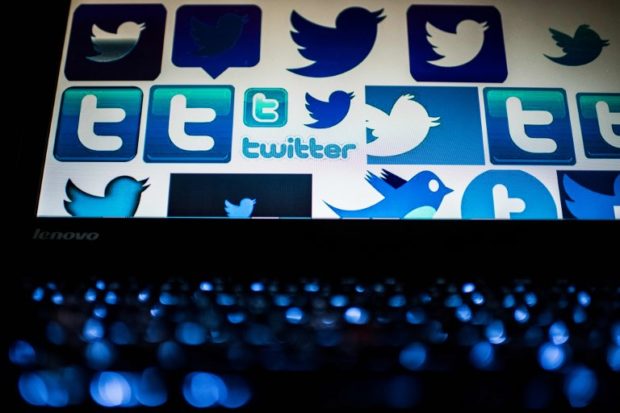
This file photo illustration taken on March 23, 2018 shows Twitter logos on a computer screen in Beijing. AP
BEIJING, China — Despite being blocked in China, Twitter and other overseas social media sites have long been used freely by activists and government critics to address subjects that are censored on domestic forums — until now.
As Beijing presses a campaign to throttle any remaining voices that stray from the Communist Party narrative, it is extending its reach to foreign sites outside of its “Great Firewall” of internet censorship.
People in China can use virtual private network (VPN) software to circumvent Beijing’s controls and access blocked foreign sites.
But fearful that the platforms could be used to coordinate political activity, the authorities have launched a stealth crackdown over the past year.
Chinese activists and other Twitter users say they have been pressured by police to delete sensitive tweets.
It’s a “silent slaughter,” said Yaxue Cao, founder of human rights site China Change.
In some cases, Chinese authorities may be getting access to and deleting accounts themselves.
Last Friday, Cao reported that the Twitter account of Wu Gan, a Chinese activist sentenced last December to eight years in prison for subversion, had been suddenly deleted — erasing more than 30,000 posts representing years of political critique and commentary.
A Chinese Twitter user who requested anonymity told AFP that he was taken in by police over tweets critical of the Communist Party.
After being held at a police station overnight, the user was made to hand over login information and watch police delete the tweets.
“You don’t know what kind of crime they’ll sentence you with. There’s no due process, so you feel scared,” said the Twitter user, who was forced to write a letter of repentance and warned against further tweeting.
“Once they threaten you, you’ll do what they say.”
Twitter declined to comment when contacted by AFP.
Online clean-up
Under President Xi Jinping, China has increased scrutiny of social media platforms and sought to restrict access to VPN software.
Authorities have not launched a full crackdown on VPNs, however, because both Chinese and foreign companies need them to do business.
On Monday, the Cyberspace Administration of China said it had “cleaned up” 9,800 accounts on Chinese social media platforms like messaging app WeChat and the Twitter-like Weibo that it accused of spreading “politically harmful” information and rumors.
The internet regulator also chastised the sites for negligence and “irresponsibility”.
Chinese Twitter users have been targeted before— one was arrested in 2012 for joking about a building collapsing on a political meeting.
But the recent police activity indicates a more concerted clampdown, triggered by an exodus of users from censored platforms that has resulted in a stronger Chinese Twitter presence, said writer and activist Li Xuewen.
“It’s the latest trend,” said Li, who was detained in 2017 over an online memorial to Liu Xiaobo, the Nobel Peace laureate and rights activist who died of liver cancer in police custody last year.
“Naturally, Twitter would become the target of the next round of attacks.”
Last month, Li received a call from police at his parents’ home in central Hubei province.
They said “higher-ups” had sent orders to find him and ask him to delete tweets.
Wen Tao, a friend of Chinese dissident artist Ai Weiwei, said he too was approached by police last month over his tweets and had heard of many similar stories.
“Activists (on Twitter) can communicate with each other and also to the outside world, in particular the Western media,” said Emily Parker, a former journalist in China who wrote about its online activists in her 2014 book
“Now I Know Who My Comrades Are.”
“Beijing is concerned about tools that could facilitate online organisation. It’s thus not surprising that Twitter would get on authorities’ radar.”
Ripple effect
Some Twitter users are let off with a warning, while others are told to delete tweets.
But the police pressure could have a ripple effect as hollowed-out accounts or farewell tweets posted by activists under duress could cause others to self-censor.
“It is a huge setback for researchers and anyone who cares about the struggles of contemporary Chinese society,” Cao wrote on China Change, describing Twitter as an “open diary” for Chinese dissidents.
Li said he plans to cut back his Twitter activity, since “speaking out these days is useless anyway”.
A user in southern Guangxi province, who was told to delete his tweets in September, said he is now cautious about what he posts.
“If I’m not careful, I’ll be asked to ‘drink tea’ again,” he told AFP, using a common euphemism for being called in by police. /ee